#한국어배우기
Text
Korean Slang을 좀치네요~
A casual phrase that was been around for a while
뭐뭐.. “좀 하다”
“Done a bit of this / Dabbled in / Done this a bit in my day”
Simply put, it is a playful way of saying someone has done something quite a bit or is pretty good at something. Which is why it’s generally used with the ~네(요) or 거든(요) grammar endings.
For example
“야 너 롤 해??”
“Do you play LoL (League of Legends)?”
“응, 나 좀 하지”
“Yeah, I play a bit”
But this has changed from 하다 (To do) to 치다 (To play a sport or instrument) but still can be used in everyday context.
So instead of saying
“너 베이킹 잘 하네!”
“You’re pretty good at baking!”
You can say
“와아, 이 빵 잘 구웠네. 너 좀 치네”
“Woah, you baked this bread so well. Guess you’re pretty good at baking”
As always, it’s not a direct translation, but you get the gist of it.
이제 구독자분들도 한국어를 좀 치시네요~
(Now you (the readers) know a bit of Korean too)
#korean#한국어#한국어 공부#studyblr#한국어배우기#learning korean#learn korean#slang#korean language#korean slang#language#kpop#korean vocabulary#south korea#seoul
216 notes
·
View notes
Text
vocab list: 미술
그림: painting, picture, drawing, sketch, illustration
페인팅: painting (영어)
페인트칠: painting (한국어)
그리다: to paint, draw, sketch a picture
끌다: to pull, draw/attract (someone's attention)
긋다: draw a line
만들다: to make (a movie, book, song), produce, direct (a movie), compose (a song)
사진: picture, photo
영화: picture, video, movie, film
영상: picture, video, image (shown on a screen)
화면: picture, image (space filled by a photo)
그림자: shadow, silhouette, reflection (on a mirror/water)
그늘: shade, dark part
미행: shadowing (secretly following someone to keep an eye on them or get evidence)
느끼다: to feel (experience an emotion in one's mind), realize, being aware of
기분: mood, feeling, atmosphere (the situation surrounding)
감정: emotion, feeling (towards a certain incident or person)
도자기: pottery, ceramics, chinaware (도기 is a bowl made of clay, and 자기 is baked at a higher temperature-1200°C-)
도예: abbreviation of '도자기 공예' -ceramic arts-
도기: pottery, earthenware
회: raw fish, round (ONLY when it's added to a number, aka a counter)
둥근: round, spheroid
차례: order, turn
계속: continuosly, consecutively
형태: shape, form, figure, appearance (of an object)
모양: shape (outer appearance/aspect) -mostly used-
형성하다: to form, build, develop a certain character or form
생기다: to be formed, come into being (something that didn't exist to come into existence)
예술: art (very broad sense, including music, painting, sculpture, architecture)
미술품: art work, fine art, work of art
미술: art (painting and sculpture)
기술: technology, skill, technique
닦다: to clean, scrub, wipe
양치: brushing teeth
붓: writing/painting brush
빗다: to brush/comb one's hair
비디오: video
텔레비전: TV
녹화: video, record, tape, videotape
무비: movie
원: circle; ₩
돌다: to turn, rotate, spin; to go around, circle
그룹: group, a circle (of people)
사회: society, circle
잉크: ink
서명하다: to sign
서명: signature, autograph
먹물: black ink (ink + water), squid ink
광장: square, plaza
사각형: square, quadrangle, tetragon, quadrilateral
평방: square (ej metros cuadrados)
제곱: square (of -maths-)
네모: square
조각: piece (of), slice; sculpture, statue
작품: piece (of music), work (of art); product, production
부분: piece, part, section, portion
하나: one, piece
하나씩: one by one, one at a time, piece by piece
일부: some/any part, portion, section, partially, partly
즐기다: to enjoy (oneself), have fun
하세요: do it, allowing someone to do something
누리다: authority to enjoy what you have in life; to enjoy someone's rights or benefits
즐겁게: delightfully
재미있다: funny, interesting, amusing, entertaining
점토: clay
진흙: mud
춤: dance (dynamic, b-boing, -방탄소년단-)
무용: dance (soft movement -ballet-)
추다: to dance
페인트: paint (pintura)
칠하다: to paint, coat, varnish
물감: paint, dye (to draw a picture or dye cloth)
색칠하다: to paint, color (something)
크레용: crayon
~을 크레용으로 그리다: to draw with crayons
~을 사생하다: to draw exactly as it is (not used in conversational korean)
주변 경치를 사생하다: draw exactly how it is viewed
사생대회: drawing/painting contest
납작한: flat (to be)
평면: plane/flat surface
아파트: flat, apartment
시시한: flat, petty, small minded; insignificant, trivial
한 푼 없는: have no money
포스터: poster
영화계: the film world (-hollywood-)
박막: a thin film (anatomical jargon)
촬영: shooting, filiming
필름: film (영화 필름, 카메라 필름, 휴대폰 액정보호 필름, etc)
행동하다: to act, behave
법률: law, act, legislation
연기하다: to act, perform (personality, behavior, etc of a role); to delay, postpone
행위: act, action (with intention, will)
대행하다: to do something for someone
source: 영단어는 관리다 app

#study#korean#koreanlanguage#koreanstudy#koreanstudying#한국어#한국어연습#한국어공부#한국어공부중#한국어배우기#korean language#한국어 배우기#한국어 공부하기#korean learning#korean langblr#learn korean#korean lesson#korean words#korean voca#korean vocabulary list#korean vocab#korean vocab list#korean vocabulary#한국어 단어#한국어 배우다#한국어 공부#한국어 어휘
293 notes
·
View notes
Photo

아무리 바람이 세차게 불어도
산은 바람에 고개를 숙일 수 없다
No matter how the wind howls,
the mountain cannot bow to it
- from Disney Movie: Mulan
✏️ 𝐕𝐨𝐜𝐚𝐛𝐮𝐥𝐚𝐫𝐲:
아무리 (adv): no matter how, however, whatever
바람 (n): wind
세차다 (adj): strong, rough
불다 (v): blow
산 (n): mountain
고개 (n): head
숙이다 (v): bow, bend
✏️ 𝐆𝐫𝐚𝐦𝐦𝐚𝐫:
1. (아무리) A/V-아/어도 grammar = even if, no matter how ~a situation occurs regardless of the previous action
E.g.
아무리 바람이 세차게 불어도 = No matter how strong the wind blows
2. V-(으)ㄹ 수 없다 grammar = can't (do V)
E.g.
고개를 숙일 수 없다 = can't bow down
🌸 🌼 🌻
Support me at: https://koreanlanguageloving.my.canva.site/
#Korean Quotes#Korean Phrases#Learn Korean#Study Korean#Hangul#Motivational Quotes#Disney Quotes#Korean Language#korean langblr#인생명언#한국어공부중#한국어 공부하기#한국어공부#한국어 문법#한국어#한국어능력시험#한국어배우기#한국어배우#한국어 배우
104 notes
·
View notes
Text
공부 시간!
Hey! It's been... a while, I know. But I am back at studying 한국어 and it's time to study some vocabulary and practice by making sentences, so here we go!
어휘 (vocabulary):
방 (room)
교실 (classroom)
문 (door)
창문 (window)
책상 (desk)
의자 (chair/stool)
칠판 (blackboard)
지도 (map)
달력 (calendar)
시계 (clock)
거울 (mirror)
옷걸이 (clothes hanger/hanger)
컴퓨터 (computer)
텔레비전 (television)
책 (book)
공책 (notebook)
필통 (pencil case)
연필 (pencil)
색연필 (color pencil)
볼펜 (ballpoint pen)
지우개 (eraser)
돈 (money)
지갑 (wallet/purse)
가방 (backpack)
휴지 (toilet paper/waster paper)
신분 (identity)
증 (certificate/card)
신분증 (identity card/ ID card)
학생증 (student card)
휴대 전화 (cellphone)
사전 (dictionary)
잡지 (magazine)
여기 (here)
거기 (there [kinda far away])
저기 (there [far away])
이 (this [close])
그 (that [kinda far away)
저 (that [far away])
Okay! Now, let's make some 문장들 (sentences)!
For these sentences, the settings I have imagined are a 교실(classroom) and a 방 (room). Let's begin :)
1st scenario (방):
이 방은 누구의 방입니까? (whose room is this?)
내 방입니다. (It's my room).
그것이 무엇입니까? (What is that [kinda far away]?)
그것이 거울입니다. (That is a mirror.)
옷걸이도 있습니까? (Is there also a hanger?)
네, 옷걸이도 있습니다. (Yes, there is also a hanger.)
2nd scenario (교실):
여기는 우리 교실입니다. 이것이 문입니다. 저것이 창문입니다. 책상들이 있습니다. 의자들도 있습니다. (Here is our classroom. This is a door. That [far away] is a window. There are desks. There are also chairs.)
지도가 있습니까? (Is there a map?)
아니요, 지도가 없습니다. 하지만, 칠판이 있습니다 (No, there is no map. But there is a blackboard.)
시계도 없습니다? (There's no clock either?)
아니요, 시계이 있습니다. 칠판하고 책도 있습니다. (No, there is a clock. There is also a blackboard and a book).
3rd scenario (교실):
필통에 무엇 있습니까? (What's in the pencil case?)
필통에 연필이 있습니다. 볼펜도 있습니다. (There is a pencil in the pencil case. There is also a ballpoint pen.)
지우개도 있습니까? (Is there also an eraser?)
네, 지우개도 있습니다. (Yes, there is also an eraser.)
색연필도 있습니까? (Is there also a color pencil?)
아니요, 색연필 없습니다. (No, there is no color pencil.)
4th scenario (방):
가방에 무엇이 있습니까? (What's in the bag?)
가방에 내 지갑하고 필통이 있습니다. (In the bag are my wallet and my pencil case).
지갑에 무엇이 있습니까? (What's in the wallet?)
지갑에 돈이 있습니다. (There is money in the wallet.)
신분증도 있습니까? (Is there also an ID card?)
네, 신분증하고 학생증도 있습니다. (Yes, there's also an ID card and a student card.)
가방에 휴대 전화도 있습니까? (Is there a cellphone in the bag?)
아니요, 휴대 전화 없습니다. (No, there is no cellphone).
And that's it for today! It's fun to study Korean again :). If you see any mistakes please feel free to point them out, thank you!
Happy studying everyone, I wish you all a nice day! <3
87 notes
·
View notes
Text


02/2021 -> 11/2022
My korean handwriting has sure changed quite significantly 👀
#personal#studyblr#langblr#korean#study#korean studying#self study#study motivation#study notes#한국어배우기#한국어공부#한국어 연습
141 notes
·
View notes
Text
🐢Day-2
🌵Essential Korean Idioms
📍Unit 2
💡 귀에 들어가다 to come to somebody's knowledge
💡눈이 높다 to have high standards
💡눈치를 보다 to try to respond according to feelings or moods of others
💡마음에 두다 to bear in mind, to hold in remembrance
💡문을 열다에 1. to start a business, open a store.
2. to open up to foreign countries.
3. to have an open hiring process.
💡보는 눈이 있다 to have an eye for something
💡얼굴에 써 있다 to show on one's face
💡시간 가는 줄 모르다 to lose track of time
💡온실 속의 화초 someone with sheltered upbringing.
💡한 치 앞을 못 보다 1. to have no foresight
2. to have superficial knowledge
#korean#korean study blog#korean slang#korean language#korean vocab#한국어 공부#한국어배우기#studyblr#영어#한국어 어휘#한국어 문법#self study#idioms#english#korean studyblr#langblr
6 notes
·
View notes
Photo
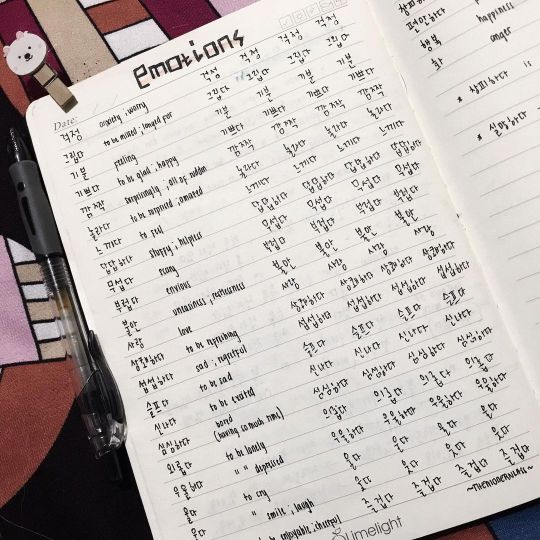
오늘의 어휘학습 (Today’s Vocabulary) : Emotions — tags: #korean #koreanstudy #koreanlanguagelearning #studykorean #studykoreanwithme #languagelearning #languagestudy #vocabulary #reviewingvocabulary #koreanvocabulary #vocabstudy #vocabularystudy #studyreview #notes #koreannotes #studywithme #koreanstudytime #한국어배우기 #한국어공부 #한국어 #어휘공부 #어휘학습 #studygram https://www.instagram.com/p/CqWz3rFhDZ_/?igshid=NGJjMDIxMWI=
#korean#koreanstudy#koreanlanguagelearning#studykorean#studykoreanwithme#languagelearning#languagestudy#vocabulary#reviewingvocabulary#koreanvocabulary#vocabstudy#vocabularystudy#studyreview#notes#koreannotes#studywithme#koreanstudytime#한국어배우기#한국어공부#한국어#어휘공부#어휘학습#studygram
7 notes
·
View notes
Text
😊💜
instagram
#korean language#한국어#learning korean#beginner in korean#learn korean#korean study#korean phrase#한국어 공부#한국어 공부하기#한글#Instagram#korean studyblr#한국어배우기
24 notes
·
View notes
Text

Korean Fairytale: 개와 돼지
underneath the story is the english translation and a vocabulary list of words used in the story
STORY in Korean:
옛날 옛적에, 한 할머니가 개와 돼지를 기르셨습니다. 할머니는 개와 돼지를 무척 귀여워하셨습니다. 할머니가 개의 머리를 쓰다듬으며 말씀하셨습니다. “참 착하구나. 집도 잘 지키고….” 할머니는 낮잠만 자는 돼지도 좋아하셨습니다.
“돼지야, 아프지 말고 무럭무럭 자라라.” 그러나 낮잠을 자고 있던 돼지는 할머니의 말씀을 듣지 못하였습니다. 돼지는 할머니가 개만 귀여워한다고 생각하였습니다. 어느 날 돼지는 개에게 물었습니다. “할머니께서는 왜 너만 귀여워하시니?”
“그것도 몰라?나는 매일 밤 집을 지키는데, 너는 밥만 먹고 잠만 자니까 싫어하시는 거야.” 돼지는 씩 웃으며 생각하였습니다. ‘오늘 밤부터 나도 잠을 자지 않고 집을 지켜야지. 그러면 할머니께서 나를 더 좋아하실 거야. 밤이 되었습니다.
“꿀꿀, 꿀꿀, 꿀꿀!” 돼지는 목청껏 소리를 질렀습니다. 돼지의 꿀꿀거리는 소리에 할머니는 잠을 이룰 수 없었습니다. ‘밤새도록 잠을 못 자고 울어 대는 것을 보니, 돼지가 병이 났나 보다.
내일 아침에 의사를 불러야겠다. 날이 밝자, 할머니가 의사를 불러 오셨습니다. 의사는 돼지의 엉덩이에 침을 놓았습니다. 돼지는 아파서 꿀꿀거리며 엉뚱한 생각을 하였습니다.
‘할머니께서 집을 더 잘 지키라고 침을 놓아 주시나보다. 그 날 밤에도, 또 다음 날 밤에도, 돼지는 큰 소리로 꿀꿀거렸습니다. “꿀꿀, 꿀꿀, 꿀꿀!” “꿀꿀꿀, 꿀꿀꿀!” 할머니는 돼지 울음소리 때문에 잠을 잘 수 없었습니다.
할머니는 몹시 화가 나셨습니다. ‘밤이면 밤마다 울어 대니 잠을 잘 수가 없구나. 내일 아침 날이 밝으면 장에 내다 팔아야겠다.' 이튿날, 할머니가 돼지를 장에 내다 파셨습니다. 돼지는 할머니의 사랑을 더 받으려다 그만 팔려가고 말았습니다.
ENGLISH TRANSLATION:
Once upon a time, an old lady raised a dog and a pig. The grandmother the loved dog and pig. She patted them on the head and said, "That's nice of you. Keep your house safe...." The grandmother also liked the pig who only took naps.
“Don't get sick, pig. Grow well." But the pig who was taking a nap didn't hear the grandmother. The pig thought that grandmother only loved the dog. One day, the pig asked the dog. "Why does grandmother think you're the cute one?”
“Don't you know that? I protect our house every night, and she doesn’t like you because you only eat and sleep." The pig thought with a grin. "I'm not going to sleep and I'm going to protect the house starting tonight." Then grandmother will like me more. Night came.
“Oink, oink, oink!" The pig screamed at the top of his voice. The old lady couldn't sleep because of the pig's gurgling. "The pig must be sick, seeing that he's been crying all night without sleeping. I'll call a doctor tomorrow morning.”
At dawn, the grandmother called for a doctor. The doctor put a needle on the pig's butt (acupuncture). The pig was sick and giggled and thought of the wrong thing.
"Grandma must be giving me acupuncture to protect the house better." That night, and the next night, the pig giggled loudly. "Oink, oink, oink!" "Oink, oink!" Grandma couldn't sleep because of the pig's crying.
She was very angry. ”I can't sleep because of the crying every night. Tomorrow morning when it’s day, I’ll sell the pig at the market.' The next day, she sold the pig at the market. Pigs aren’t sold to stop trying to get more love of grandmother.
🐷🐶Vocabulary List:
옛날 옛적에 - once upon a time
한 할머니 - a grandmother
개와 돼지 - dog and pig
기르다 - raise, bring up
무척 - very, extremely
귀여워하다 - love, make a pet of
쓰다듬다 - to pet, stroke
말씀하다 - to say (honorific)
참 - truly
착하다 - kind
지키다 - to protect
낮잠을 자다 - to nap
만 - only, just
아프지 말고 - don’t be hurt/sick
무럭무럭 - persistently
자라다 - to grow
그러나 - but, however
어느 날 - one day
물다 - to ask
께서 - to, from (honorific)
매일 밤 - every night
씩 웃다 - smile mischievously
그러면 - if so, then
꿀꿀 - oink
목청껏 - at the top of one's lungs
소리를 지르다 - shout, cry
꿀꿀거리는 소리 - grunt
잠을 이룰 수 없다 - fail to get sleep
병이 나다 - to be sick
았/었나 보다 - guess, It seems like
불러오다 - call in
날이 밝다 - day break
자(마자) - as soon as
엉덩이 - butt
침을 놓다 - apply acupuncture
엉뚱하다 - bizarre, strange
그 날 밤에도 - that night also
또 - also
다음 날 밤에도 - the next night too
큰 소리로 - loudly, in a loud voice
울음소리 - crying sound
몹시 - very, seriously
화가 나다 - to get angry
밤마다 - every night
울어 대다 - cry a lot, bawl
장에 내다 - put
팔다 - to sell
이튿날 - next day
파다 - dig
그만 - stop
팔리다 - be sold
📚FIND MORE STORIES HERE!
#한국어#korean langblr#korean fairytale#korean folktale#korean story#korean stories#improve korean reading#korean reading practice#korean language#한국어배우기#한국말
28 notes
·
View notes
Photo

How to say a "low ceiling" in #Korean? How to describe anything the same way? Get a #preview on how to do that here! 👇 https://youtu.be/nrq6eoTFEeg #HelloKorean #Adjectives #Grammar #spokenkorean #koreanlanguage #btsarmy #bts #kpop #kdramas #kdrama #LoveClass #AB61X #형용사 #한국어 #한국말 #한국어공부 #한국어배우기 #한국어공부중 #한국어능력시험 #한국어단어 #한국어선생님 #한국어수업 (at Adjective) https://www.instagram.com/p/CeLY9DQpZIF/?igshid=NGJjMDIxMWI=
#korean#preview#hellokorean#adjectives#grammar#spokenkorean#koreanlanguage#btsarmy#bts#kpop#kdramas#kdrama#loveclass#ab61x#형용사#한국어#한국말#한국어공부#한국어배우기#한국어공부중#한국어능력시험#한국어단어#한국어선생님#한국어수업
0 notes
Text
T발 너 C야?
In Korea, personality types have always been a talking point. In recent years MBTI has taken over, but before that it was blood-types. In social situations people would ask each other their MBTI, or made to guess the other persons, and this spread to the internet as well. Memes of the different types were popularized and have kept evolving.
One that was incredibly popular was
“너 T야?”
"Are you a T?"
T being “Thinkers / 사고형”, which is the opposite of F which are “Feelers / 감정형” Which came from when someone was being too rational or unsympathetic.
This evolved into
“야 너 T야?”
“Oi, are you a T?” (야 is an very informal way of calling to someone.. oi seems more of a correct translation than Hey!)
“응 나 T야, 프리티!” “큐티!”
“Yeah, I am a T, Pretty” "Cutie"
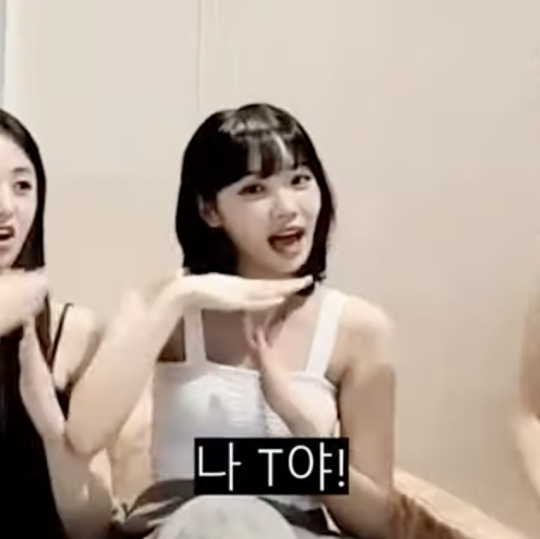
Then in a more crude way, people would say
“씨발, 너 T야?”
“Fuck, are you a T?”
Because of the similarity of 씨(C) and 티 (T) people would jumble it around and say
“T발, 너 C야?”
Which is just the modern way of referencing “너 T야?”, so the next time someone gives you a T kind of response, hit them with the “T발, 너 C야?”
#한국어#korean#studyblr#한국어 공부#한국어배우기#english#slang#korean slang#kpo#k#learn korean#korean language#learning korean
79 notes
·
View notes
Text
vocab list: 신체
눈: eye, eyeball, eyesight; snow; gradation, marking, graduation
시선: one's eyes, graze, eye-catching
안구: eyeball
쳐다보다: to look up, look/stare (at), gaze (at)
눈길: to watch something/someone; street made of snow stick
귀: ear
청각: sense of hearing
청력: hearing (hearing capability that can get lost with the years)
이삭: ear, head of the rice, barley, etc where a flower opens and the fruit comes from
눈썹: eyebrow
눈사을 찌푸리다: to frown
심장: heart
마음: heart, mind, personality
가슴: heart, chest, breast, bust, boobs
중심: center, heart, middle; focus, nucleus, core; emphasis, importance
머리: head, hair; brain, mind, intelligence
지도자: leader, head (of)
머리카락: hair
털: hair, fur, heather, fluff
섬유: fiber, textile
목: neck, throat
몸: body (pure korean)
신체: body, physical (chinese derived, used more in formal situations)
단체: organization, association, society, group, party
시체: dead body, corpse
몸매: body figure/shape
무릎: knee
무릎치기: idiomatic expression meaning to figure sth out/to realize; knee breenches (male pants that go to the knees)
무릎으로 치다: hit with the knees
발: foot, paw, step
걷다: to walk
기슭: foot, base, border, edge (mountain, hill, river, etc)
보병: foot soldiers, infantry (play the main roles in the army, move by foot and attack enemies with rifles, etc)
발가락: toe
발끝: tiptoe
손: hand
주다: to give (an item to someone or a qualification, right, score)
도움: help, aid, assistance, support
반수: half of a number divided equally by 2
맡기다: to assign, charge (someone the responsibility for a certain role or work); entrust, leave something with
손가락: finger
지적하다: to point out, indicate, comment, criticize
손톱: (finger) nail
못: nail (clavo)
분석하다: to analyze
잡다: to hold (something in one's hand and not let it go); arrest, catch, capture (someone)
어깨: shoulder
책임을 지다: to assume/bear/shoulder/take the responsibility; hold oneself responsible for
갓길: side road for emergencies
얼굴: face
직면하다: to confront, face, come face to face with
표정: face expression
입: mouth, lips, one's taste
말: word, language, speech, talk
입구: entrance to/of, entry, way in
치아: tooth (humans and animals, hospitals use it)이tooth (expression for naming the different parts of the teeth, like molars; it's rarely used by itself)
톱니: tooth of a saw
코: nose
후각: sense of smell
팔: arm
무기: weapon, armaments
무장하다: to be armed, militarized
부문: section, field, division
팔걸이: armrest part of a chair
허벅지: thigh
source: 영단어는 관리다 app

#study#korean#koreanlanguage#koreanstudy#koreanstudying#한국어#한국어연습#한국어공부#한국어공부중#한국어배우기#korean language#한국어 배우기#한국어 공부하기#korean learning#korean langblr#learn korean#korean lesson#korean words#korean voca#korean vocabulary list#korean vocab#korean vocab list#korean vocabulary#한국어 단어#한국어 배우다#한국어 공부#한국어 어휘
145 notes
·
View notes
Photo
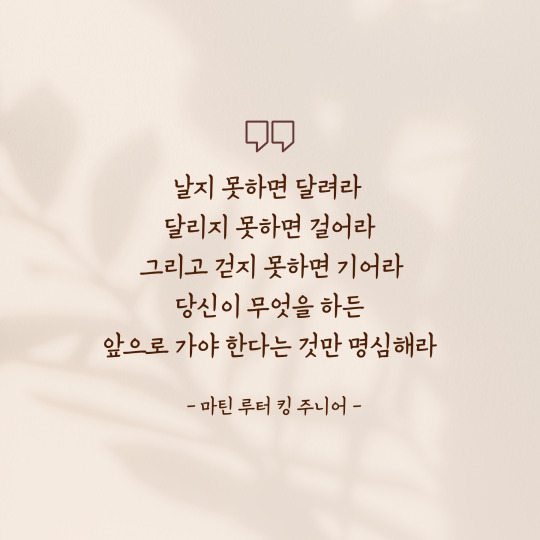
날지 못하면 달려라. 달리지 못하면 걸어라. 그리고 걷지 못하면 기어라, 당신이 무엇을 하든 앞으로 가야 한다는 것만 명심해라.
– 마틴 루터 킹 주니어
If you cannot fly then run. If you cannot run, then walk. And, if you cannot walk, then crawl, but whatever you do, you have to keep moving forward.
– Martin Luther King Jr.
✏️ 𝐕𝐨𝐜𝐚𝐛𝐮𝐥𝐚𝐫𝐲:
날다: fly
달리다: run, dash
걷다: walk
기다: crawl
그리고: and
무엇: anything, something
앞: front
가다: go
명심하다: keep (sth) in mind, bear (sth) in mind, be sure to remember
✏️ 𝐆𝐫𝐚𝐦𝐦𝐚𝐫:
1. V~지 못하다 = cannot V
E.g. 날지 못하다 = cannot fly/ be unable to fly
2. V~아/어 라 = used when the speaker demands or directs the listener for doing some work.
E.g. 날지 못하면 달려라 = If you can't fly, run
#KoreanVocabulary #KoreanLanguage #quotesdaily
🌸 🌼 🌻
Support me at: https://koreanlanguageloving.my.canva.site/
#Korean Language#korean langblr#Learn Korean#Study Korean#Hangul#Korean Quotes#positive quotes#한국어 배우기#한국어 단어#한국어 공부하기#한국어배우기#한국어 연습#한국어공부중#한국어#한국어공부해요#한국어공부#한국어공부하기
74 notes
·
View notes
Note
천이백구십팔만 구천구십이
Hi and thank you so much for your ask <3
I think here there's also two different numbers, the first one being 천이백구십팔만, and the second one being 구천구십이.
시작 하자 〰️
천이백구십팔만: 12,980,000
구천구십이: 9,092
That first one was a challenge ngl! But it's definitely fun to practice sino-korean numbers again.
Please do correct any mistakes if you spot any, thank you <3
Let's keep going! Happy studying ~
REFERENCE:
백: 100
천: 1,000
만: 10,000
십만: 100,000
백만: 1,000,000 (7 numbers)
천만: 10,000,000 (8 numbers)
억: 100,000,000 (9 numbers)
십억: 1,000,000,000 (10 numbers)
백억: 10,000,000,000 (11 numbers)
천억: 100,000,000,000 (12 numbers)
조: 1,000,000,000,000 (13 numbers)
#ask#sino-korean#korean#한국어#한국어공부#한국#한국어배우기#sino-korean numbers#korean learning#learning korean#learn korean
26 notes
·
View notes
Text

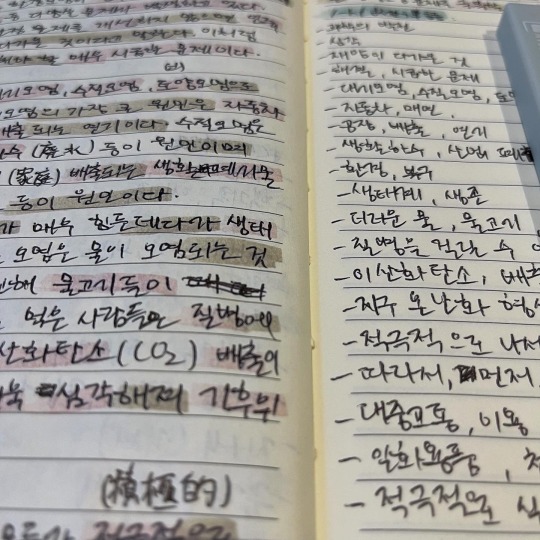


recent korean studies 💗
#personal#studyblr#langblr#korean study#korean study blog#korean studyblr#korean study notes#한국어배우기#한국어 공부#한국어공부중#한국어 연습
40 notes
·
View notes
Text
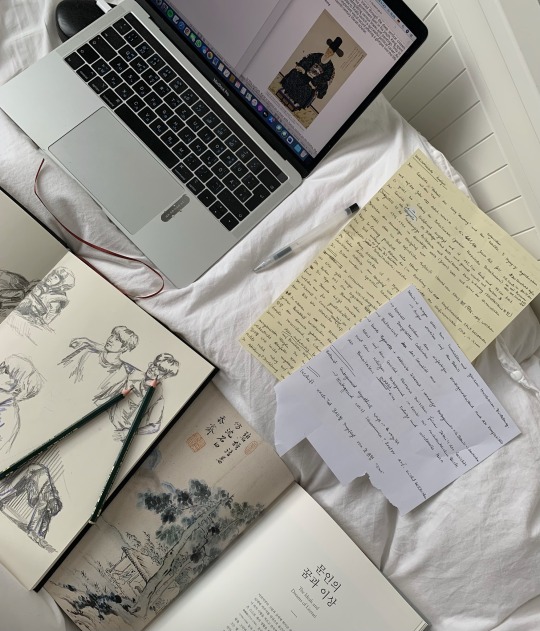
8 hours till submission deadline
check my insta you want 🐰
#studyblr#korean#langblr#hangul#한국어배우기#studyaccount#studyinspiration#studying korean#한국어#art aesthetic#art history#east asian art#asian art#light acadamia aesthetic#light academia#book blog#中文学习#中条あやみ#studying chinese#language study#gold aesthetic#cozy aesthetic#aetshetic#sketchbook#bts fanart#bts drawing#sope fanart
1K notes
·
View notes